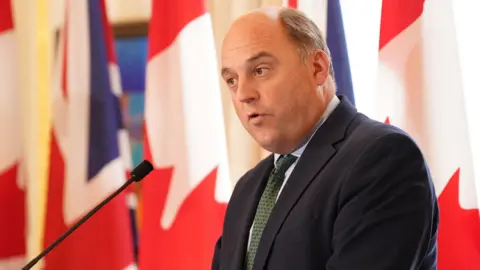In a continuing unfolding narrative surrounding the sensitive issue of data privacy, former UK Defence Secretary Sir Ben Wallace recently defended his position regarding an injunction related to a major data breach involving Afghan interpreters. This significant issue came to light after reports revealed that personal data of nearly 19,000 Afghans who had assisted British forces during the war in Afghanistan was leaked. Following the revelation, Wallace expressed that he felt no remorse over his actions to stop reporting on the breach, emphasizing that his primary concern was the safety of those affected.
Writing an opinion piece in the Telegraph, Sir Ben Wallace articulated that the injunction served was not intended to cover up the errors surrounding the leak but was a necessary measure to protect individuals potentially at risk. The situation gained substantial media attention in the wake of disclosures about the data breach that occurred in February 2022, which became more public when sensitive details were posted on social media site Facebook in August 2023. Faced with these alarming developments, Wallace insisted that his priority was safeguarding the lives of those named in the leaked information.
He further stated that had the Taliban been alerted to the existence of a list containing the names and affiliations of these individuals, the consequences could have been dire. His reflections underline the precarious circumstances in which many Afghans finding themselves threatened by the Taliban during a time of political upheaval. The leak not only exposed the names and contact details of many who had risked their lives supporting British forces but also created immense fear and panic among affected families.
In response to the backlash regarding the breach, the UK government established the Afghanistan Response Route in April 2024, which was designed to facilitate the relocation of individuals identified on the leaked list. To date, around 4,500 Afghans have been successfully relocated to the UK under this scheme, which is estimated to have incurred an approximate cost of £400 million, with projections estimating final expenditures could reach as high as £850 million.
Compounding public outrage, a High Court ruling recently lifted a gag order that had suppressed details about the data breach and the government’s response, which further fueled calls for accountability. This ruling allowed the narrative to come fully to light, revealing the extent of the leak, which encompassed names, contact details, and familial information of individuals under potential threat from the Taliban.
The daughter of one Afghan translator affected by the leak shared her harrowing experience during a televised interview on the BBC’s Newsnight. She communicated that her family is in a “state of panic,” expressing concerns about the possibility of the leaked information reaching the Taliban, thereby endangering their loved ones still in Afghanistan. Moreover, the revelations surrounding the breach prompted many political figures to voice concerns regarding transparency and accountability within the government.
In Parliament, Defence Secretary John Healey acknowledged that the individual responsible for the breach is no longer in the same role, extending a public apology on behalf of the government. Additionally, Conservative leader Kemi Badenoch issued a statement of regret on behalf of her party. Former Conservative leader Sir Iain Duncan Smith raised alarms over the absence of updates to Parliament regarding the breach, arguing that the public deserves to be informed on governance issues of this magnitude.
The entire affair underscores pressing issues around data protection, government accountability, and the moral obligation to protect vulnerable populations in crisis situations. Sir Ben Wallace’s refusal to apologize for the injunction adds layers to the debate regarding the balance between operational security and transparency in governance—an ongoing concern that the UK grapples with amid its complex political landscape.











